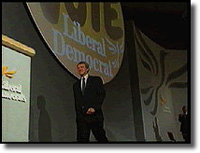
|
The 1992 General Election - Liberal Democrats
David Owen, a founding member and the then leader of the SDP, opposed the merger and refused to join the Liberal Democrats. Once a rising star of the Labour Party and a former Labour Foreign Secretary, by the 1992 election Dr Owen was refusing to give his backing to the Liberal Democrats and advising voters to support the Conservatives. Dr. Owen was subsequently appointed as the European Union's peace negotiator in Bosnia. Paddy Ashdown (now the longest serving of the three main party leaders) was elected leader of the newly formed Liberal Democrat Party in July 1988. He faced a daunting task when he inherited the leadership and for a time things went very badly. In the May 1989 European elections, the Liberal Democrats polled a mere 6%. With environmental issues at the top of the political agenda, the Green Party had garnered most of the protest vote taking 15% of the poll. However, by late 1990 the Lib Dems had staged a dramatic recovery. In October 1990, they took the safe Conservative seat of Eastbourne with a swing of 20%. By the time of the local elections of 1991, they were polling around 21%. Their resurgence reflected the concerted efforts by the major parties to adopt the 'green agenda', thus squeezing out the Green Party as a distinctive voice, and increasing the personal popularity of Ashdown. While Ashdown had been less successful at planting in the voters' minds the idea of the Lib Dems as a distinctive, radical alternative, he had established himself as a distinctive party leader. His firm stance on the Gulf War seemed to pay dividends. During the latter part of 1991 and early 1992, opinion polls consistently showed Ashdown was the most popular of the party leaders. The revelation in February 1992, only two months before the election, that he had had an affair some years earlier with his secretary didn't really dent his popularity. His open admission of the affair and of his culpability seemed to go down well with the voters. It reinforced his image as a no-nonsense leader prepared to tell the voters the hard truth.
|
Diana, Princess of Wales, 1961-1997
Conference 97
Devolution
The Archive
News |
Issues |
Background |
Parties |
Analysis |
TV/Radio/Web
Interactive |
Forum |
Live |
About This Site
News |
Issues |
Background |
Parties |
Analysis |
TV/Radio/Web
Interactive |
Forum |
Live |
About This Site
© BBC 1997 |
politics97@bbc.co.uk |
